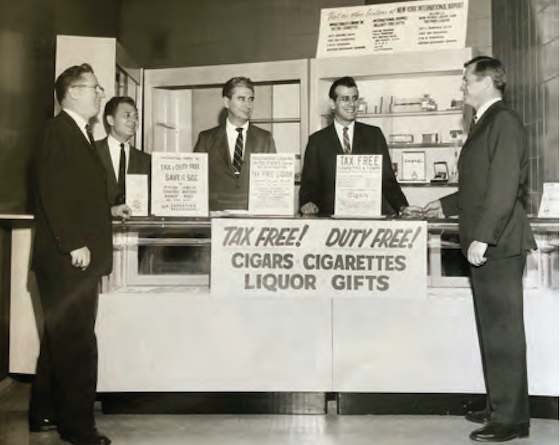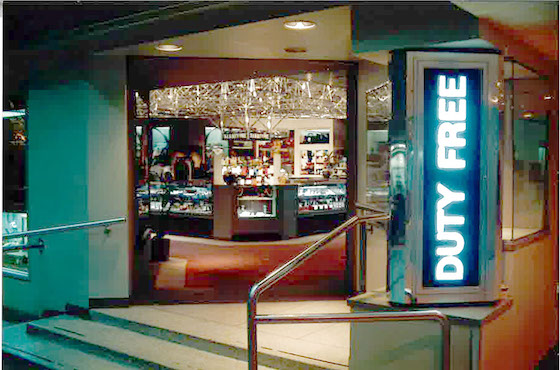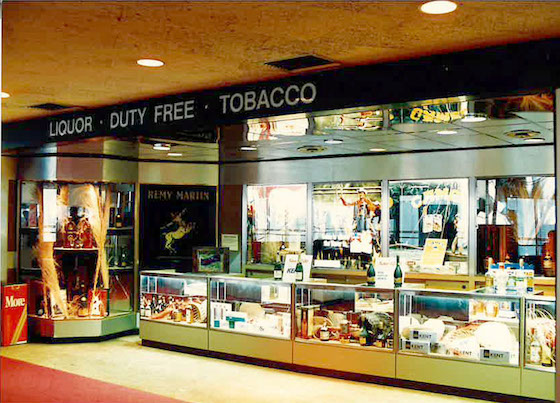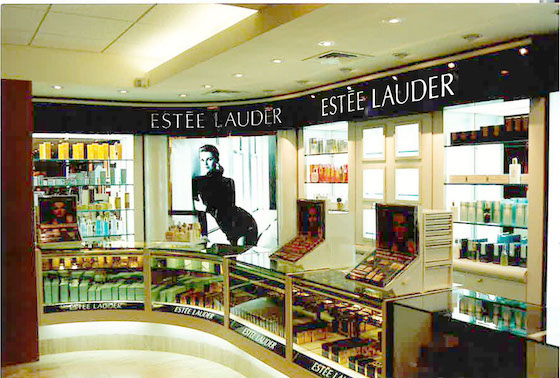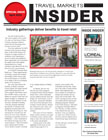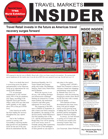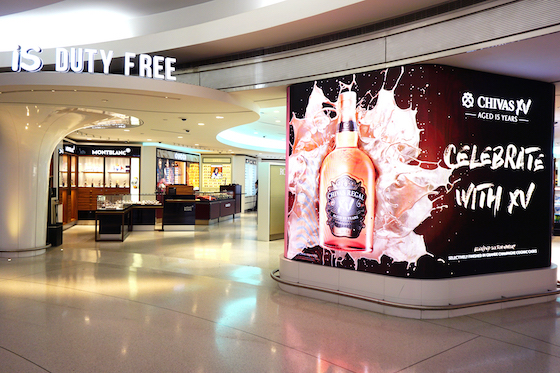
International Shoppes transformed its duty free offer at JFK T1 in late 2018. The stunning entrance of the International Shoppes duty free store at JFK Terminal 1 is dominated by a 17-foot video wall.
In 1951, two young men in New York City got together and opened a jewelry store in the brand new Port Authority Bus Terminal. With that endeavor, Herman Greenbaum, who operated several jewelry stores in Manhattan, and Fred Rosenberg, a watch-maker originally from Germany, who learned the trade while living in a children’s camp in Switzerland, began a legacy that today operates some of the most successful duty free and travel retail stores in airports in the United States.
International Shoppes, which today is operated by the children and grandchildren of its founders, maintains all of the integrity and heritage of Fred and Herman, in an enduring partnership that has connected the two families over three generations and 70 years.
Travel Markets Insider had the distinct honor of meeting with all of the current owners as they reminisced about the highlights of their shared history and look forward to what the future might bring.
“Fred and Herman opened in the Port Authority in 1951 and their first sale was a watchband for a dollar,” commented Stephen Greenbaum, Herman’s son and current IS CEO.
“They sold a LOT of watchbands at the Port Authority. It was amazing,” added Joanne Halpern, Fred’s daughter and Vice President.
“It was a family business from the very start. The store was called Gare, which was an acronym for Greenbaum Anne Rosenberg Erna, named after their wives. Gare also meant ‘train station’ in French,” said Matt Greenbaum, Stephen’s son and an IS vice president.
The two young men eventually operated two jewelry stores and a hugely successful lottery kiosk and stationery store at the Bus Terminal, where they continued to have a presence into the early 2000s. Importantly, the Port Authority Bus Terminal business led them into the airport.
Joanne Halpern recalls: “They used to fix all the Port Authority people’s watches, so they knew everybody. And many airport managers came out of the Bus Terminal, so when opportunities opened up, they asked Herman and Fred to come to the airport. In those days business was by a handshake, not an RFP.”
In 1961, the two opened a jewelry store at the International Arrivals Building at Idlewild International Airport (now JFK), which soon became the first International Shoppes duty free store.
Scott Halpern, Joanne and Michael’s son and an IS vice president, describes the early years: “The first store was beauty and jewelry. At that point duty free was segregated between liquor and tobacco in one house and beauty and fashion was a different store. It was a great opportunity for the two partners. It was the dream of being in the airport. It was new and cutting edge. It was the idea of moving up from the Bus Terminal to an airport.”
IS President Michael Halpern, comments further: “One of the things that was really instrumental in our development was that we made a business out of duty free not having liquor and cigarettes. We always had an emphasis on the other products. We were the first ones to have skincare products in the airport duty free for example. We were the first ones to open Lancôme, which was a big breakthrough and how great is it that we are still working with them today? Then we delved into cosmetics and we always sold a lot of fragrance. We did very well with these categories.
“We built our company around the accessory items not around the staples of liquor and cigarettes. It was a real challenge for us to succeed because at that time everybody was buying a bottle and a carton, that was it.”
And then there was liquor
Michael Halpern continues: “Someone at Northwest Orient Airlines, which operated out of the TWA Terminal 5, created a duty free shop out of a barbershop and shoeshine store. We operated the duty free part—we had liquor displays on the armrests of the seats. The airline wanted a duty free but didn’t have room to have a separate shop. That was our first foray into a major airline, and we started to carry cigarettes and liquor – a big breakthrough.”
“But the thing we learned from Herman and Fred was that when the landlord comes with an opportunity, just say yes,” added Stephen.
International Shoppes next added Tower Airlines – a regularly scheduled airline offering charter fares to Amsterdam and Tel Aviv.
“At one time we had stores at TWA and Pan Am, and Eastern Airlines! All the airlines that have gone out of business,” Michael quipped. “The basic thing with our company, with all these experiences that we have had with duty free, is that we met a lot of great people and we parleyed that into other businesses—but our roots are really firmly established in duty free. That is our future and that is where our bread and butter has been, always.”
One of IS’s related businesses was newsstands. “We had the newsstands throughout the various airports and also off-premise in the airport hotels, and in the casinos in Atlantic City. We were in Bally and Caesar’s. We tried a lot of different things as an organization,” said Scott Halpern.
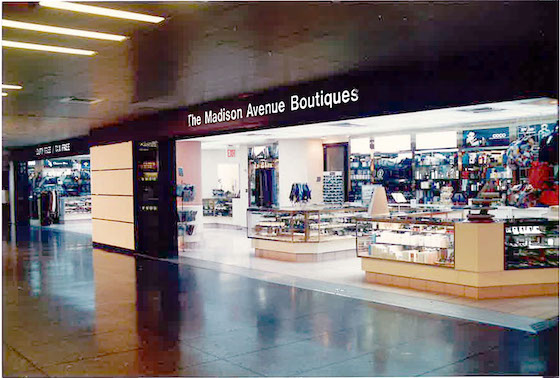
International Shoppes’ strong relationships with luxury and international brands was evident in these pictures of its stores at JFK in the 1980s and 1990s.
Philadelphia calls
Airport- wise, IS’s first step outside of JFK was Newark, where they had a partnership with EJE.
“And from there we went to Philadelphia,”’ said Scott. “Nuance had won the Philadelphia duty free contract but decided not to proceed after 9/11. Philadelphia made a call up to Kennedy airport and asked if they had a recommendation for someone to run the stores. We were the main player at Kennedy airport and they recommended that they speak to us. We drove down the next day and before we knew it we were working with Customs and getting approval to open up operations in Philadelphia.”
“Philadelphia was our first big play out of the area. It was close enough, and yet far enough that we could build up a model to do remote business,” added Michael.
“We did a great job enhancing the duty free experience, by taking a generic store and putting in personalized vendor fixtures in PHL to showcase a first class store,” noted Scott.

International Shoppes opened luxury boutiques at BOS Terminal E in 2017 for Dior, Lancôme, Chanel, and a joint Estée Lauder/La Mer space.
Boston and more
IS won the Boston duty free concession contract in 2011 and in the first year personalized the store and doubled the sales, recalled Matt Greenbaum.
“We were up there living out of a hotel room the first few months to make sure that our DNA was really embedded in the ways the store was run. We brought up team members from New York and Philadelphia to help with the transition and create a new culture, which was International Shoppes Culture,” explained Scott.
“We turned over management quite a bit there until we got a solution that we were really happy with. We thought it was important to bring in the right people,” added Matt.
In 2014, IS opened its first shop in Dulles International Airport, partnering with Estee Lauder in an 1,800 sq. ft. multi-branded boutique featuring the Estée Lauder, Clinique, Jo Malone, MAC, and La Mer brands as well as a fragrance back wall. Two and a half years ago, the company opened a MAC store in Baltimore-Washington International airport.
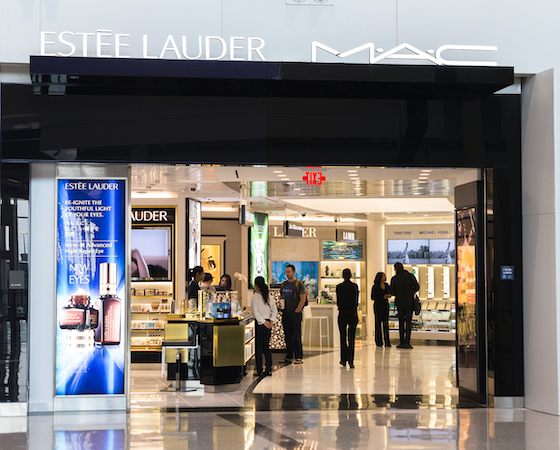
In 2014, IS opened its first shop in Dulles International Airport, partnering with Estée Lauder in an 1,800 sq. ft. multi-branded boutique featuring the Estée Lauder, Clinique, Jo Malone, MAC, and La Mer brands.
Moving off I-95
IS started to look further afield for new endeavors. But Michael Halpern recalls that Fred had also warned him to not bite off more than they could chew.
“We looked at Chicago when the RFP was coming up, but I realized that we could not have done it at the time,” he said.
“The first time we tried to get off the I-95 Corridor, 300 miles north or south of us, was Detroit Airport. We bid on that and unfortunately we fell short. But, when the opportunity came for Houston in 2019, we had done so much work on how to build an operation outside of our wheelhouse, we were able to have a proper go at it. We had learned a lot during the Detroit bid, which gave us the opportunity to eventually become the winner in the Houston bid,” said Scott.
“We brought a team out of Boston and JFK down to Houston. For the first two months we had at least one person from either New York or Boston at the stores for every shift. We needed to bring on that International Shoppes mentality,” added Matt.

Matt Greenbaum and Scott Halpern in front of their first venture off the I-95 Corridor at Houston Intercontinental Airport in September 2019.
Customer service and the International Shoppes way
“We use the word bespoke to describe our stores because we don’t have one solution for all of our locations. We have a new solution every time,” explained Matt. “We probably overspend in terms of design, architecture, and building. But I think that is what separates us from others. We really tailor the store that we are developing to every particular location and customer that we are servicing. And that is really what we are about. We don’t have a one size fits all.”
This philosophy always boils down to creating a customer first experience.
“I think our team’s mindset of turning a browser into a shopper is tremendous. Our management team, from the office to the stores and the sales force that we have, do a tremendous job of discovering the consumer and finding out what they are looking for,” Matt continued.
“Good is not good enough. How do we get to great? How do we get to superb?” added Scott.
“It is customer first, but we are running the shops at the pleasure of the respective landlords. We always look at everything through those lenses and make sure we are doing everything in our power to run a great business. Because we know there are other operators out there and landlords have options. We want them to know there is something special when they select International Shoppes. I think we have done a really good job over the years of becoming more of a bespoke operator. That’s what new airports and our airports see when they consider International Shoppes,” said Matt.
Michael Halpern summed it up: “IS has this saying—‘we want the customer to feel happier when they leaves the store than when they walked in.’ That is what we want to do.”
The luxury specialist
“Obviously liquor and tobacco, beauty, confectionery is a big part of our duty free experience, but I think as an organization we have mastered the experience for high-end luxury. The high-end luxury experience: Hermes, Bvlgari, Ferragamo, Coach to name a few. The premiumization of the airport landscape as it looks today,” said Scott.
“We were really on the cutting edge back in 2000 of what a store could look like and a roadmap for a lot of these companies,” added Matt.
Joanne Halpern has been the architect of the IS push into luxury.
“We were the first in luxury. We had the first Cartier shop, the first Coach shop, we had the first Nicole Miller, we weren’t the first in Bvlgari, but we definitely opened the market for luxury in the United State. Other companies soon followed when they realized what an important part of the business that could be,” she said.
“At Delta, we came up with the concept of American Designers, and that is where Nicole Miller and Coach and others came in. We opened one store with multi-American brand concepts, where we had Timberland, Calvin Klein, and others, that we called Design America. Then our competitors followed. They realized that in America, luxury was still a very important part of the business. Europe knew that way before we did.”
“We also opened the first duty freeEstée Lauder Boutique, which was a stand-alone location down the hall from the duty free store. Later on we opened an Estee Lauder/Clinique store,” added Michael Halpern.

International Shoppes celebrated its 70th anniversary in June. Shown above: Matt Greenbaum, Michael Halpern, Stephen Greenbaum, Randy Honig, and Scott Halpern.
IS prepares for the future
International Shoppes is a family business and has always been one.
“Herman and Fred were in the stores every day. When they got to the airport their office was right across the hall from the store. Every flight that went out they were there,” commented Stephen Greenbaum.
“Corporate identity has always been that management and ownership worked in the store, and been a part of the store team. The employees that came through saw Herman or Fred day in and day out. They were not working for them, they were working with them,” he continued.
“Stephen and I were groomed all the time to take over the business. And we had good mentors,” said Michael Halpern. “Stephen’s Dad and Fred realized that in order to succeed you had to have a succession plan. We made our mistakes, but he and I learned from it, and we put that into effect for the third generation.
“It’s very hard for a business to go from one generation to the next, but it’s even harder to go from the second to the third. And we navigated it very well. Stephen and I are taking a back seat on a lot of the business now and Scott and Matt are doing very well and learning the business. Through this COVID crisis, I think they have done an exemplary job.
“Enthusiasm is what makes the business. The success of any business is in the mindset. The work ethic is there. Having a business and having the tools is one thing, but having the enthusiasm that our families have, makes the difference,” Michael concluded.
“Our plan the last 18 months or so was to weather the storm,” commented Matt. “I think we have done a great job of keeping the business going at the same time getting ready for what air travel will look like in the future.”
“We believe in aviation,” said Scott. “Looking back to January and February of 2020, we crushed what our expectations were on Houston. It showed that we can go across the country. In the past, our mentality was that we had to be in driving distance. Are we looking to expand globally? No. But anywhere across the continental U.S. is game on for us.”
“It is an honor to service the airports that we’ve been at and the airports that we will potentially service in the future. We look forward to the next 70 years.”




